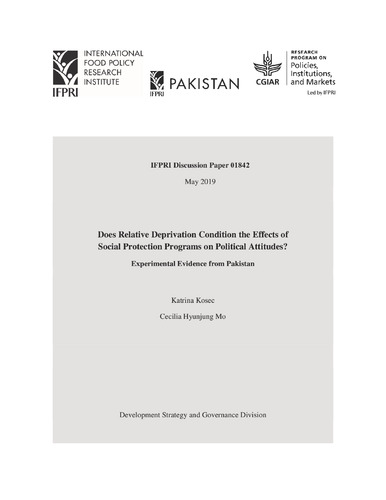Does relative deprivation condition the effects of social protection programs on political support? Experimental evidence from Pakistan
Abstract
2022 UPDATE: Could perceived relative economic standing affect citizens’ support for political leaders and institutions? We explore this question by examining Pakistan’s national unconditional cash transfer program, the Benazir Income Support Program (BISP). Leveraging a regression discontinuity approach using BISP’s administrative data and an original survey experiment, we find that perceptions of relative deprivation color citizen reactions to social protection. When citizens do not feel relatively deprived, receiving cash transfers has little sustained effect on individuals’ reported level of support for their political system and its leaders. However, when citizens feel relatively worse off, those receiving cash transfers become more politically satisfied, while those denied transfers become more politically disgruntled. Moreover, the magnitude of the reduction in political support among non-beneficiaries is larger than the magnitude of the increase in political support among beneficiaries. This has important implications for our understanding of the political ramifications of rising perceived inequality.
2019 Abstract: Why might citizens fail to reward incumbents for providing private goods? While extant literature on the political consequences of targeted government welfare programs has focused on attribution challenges and low levels of civic education and engagement, we offer an additional explanation related to perceived inequality, or the feeling that one is poor relative to other citizens. Leveraging a regression discontinuity design and a survey experiment, we identify the causal effects of a large cash transfer program in Pakistan when relative deprivation is and is not pronounced. When relative deprivation is not salient, we find that cash transfers have little effect on attitudes toward government. However, when relative deprivation is salient, those receiving cash transfers experience increased support for their political leaders and institutions, while those denied transfers become more politically disgruntled. This has important implications for our understanding of the political ramifications of rising inequality and social protection programs.

